How to Get Rid of Mosquitoes in the House
Every year, there are thousands of mosquito-borne illnesses reported in the United States. These include the West Nile virus and Zika.
Eliminating the risk of getting a mosquito bite will ensure that you and your family stay healthy. Keeping mosquitoes away from your property all together is mainly about breaking the breeding cycle. But sometimes, the pests get into the house despite your outside efforts.
Whether you have trouble with mosquitos in your yard or your home, this article can help. We'll show you how to keep mosquitoes out of the house and eliminate them if they're already there. Because getting them out of the house is only the first step, we'll also show you how to repel mosquitoes from taking up residence in your yard and how to kill them if they are already there.
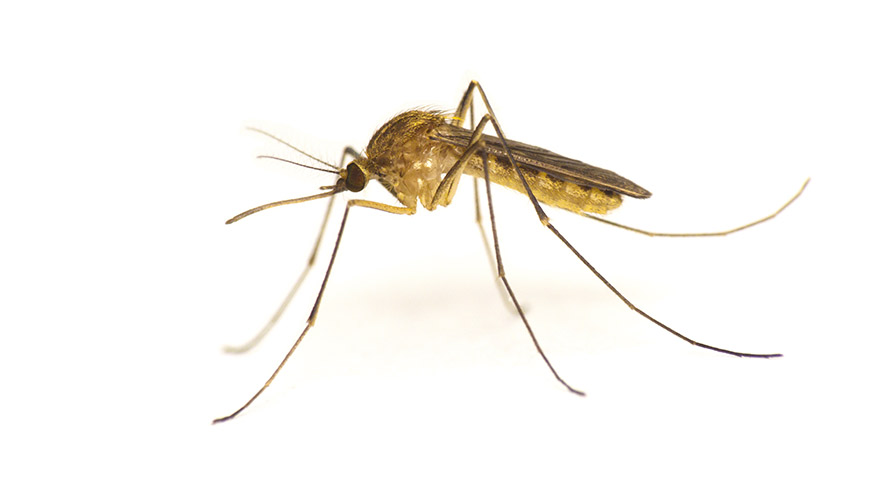
How To get rid of mosquitoes in the house
The basics of getting them out are to first take away their entrance, and then kill off any of the mosquitoes still in the house. Here are several tips and recommended products that can help.
1. Block entry points
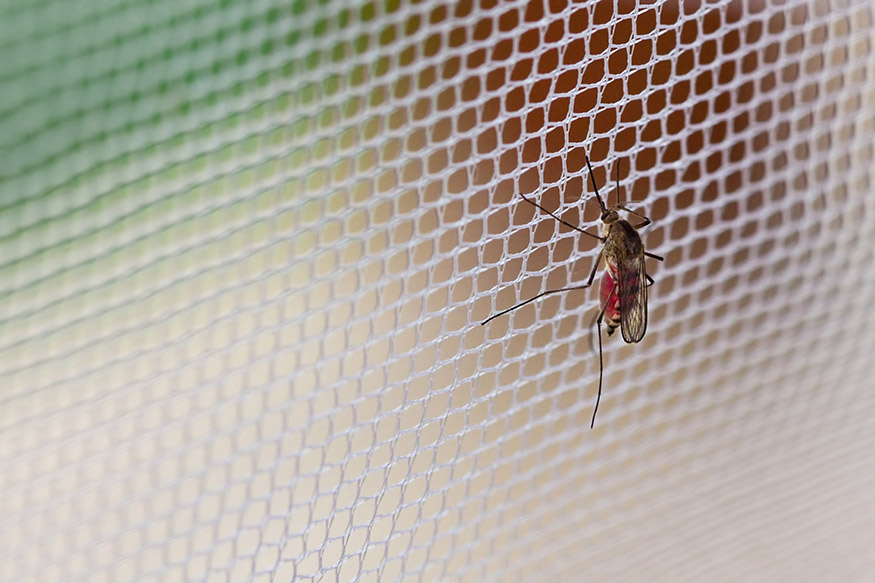
You should do your best to block any way that the mosquitoes are coming into your house. Check the seals around your doors and windows to make sure there aren't any cracks. Make sure your window screens are operating properly and that they don't have any holes.
If your screens have holes, you should be able to replace them by going to any home improvement store. Be sure to bring your window measurements along so that you know exactly which size to purchase. Some screens can be purchased online.
You should be aware that mosquitoes are attracted to carbon dioxide, so they will be able to find any holes and gaps where the air is coming through.
2. Use a mosquito trap
Once the gaps and holes are filled and the mosquitoes have no way to enter your house, you will need to find a way to eliminate the ones that are inside already. A mosquito trap is one way to do this.
These traps work by emitting a light that attracts the mosquito to enter the trap. Once they enter, it kills them. All you must do is empty it and clean it out occasionally.
The best mosquito trap by far is the Mozi mosquito vacuum. It attracts the mosquito using a UV light and then silently sucks it in and traps it. These devices work best when used in multiple locations around the house at once – and they are cheap!
Best Choice
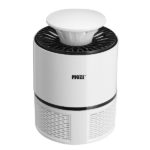
Mozi Mosquito Vacuum
- Silent operation for all night protection
- Kid-safe – non-toxic and safe for little fingers
- Traps mosquitoes to stop them biting!
3. Use an ultrasonic insect repeller
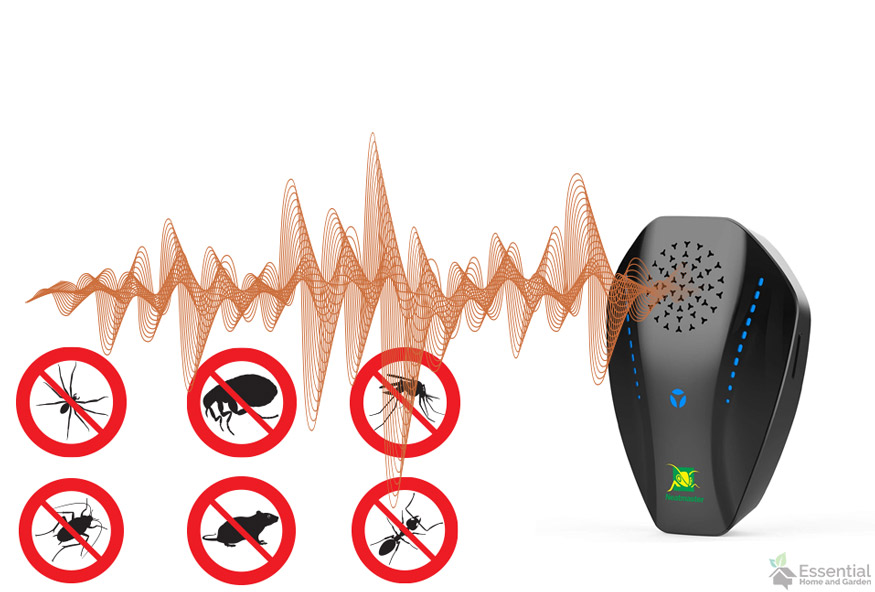
An ultrasonic insect repeller emits a noise at a frequency not noticeable to humans. But bugs aren't willing to come near.
This type of device is normally plugged into one or more of the outlets in your house to keep any mosquitoes from sneaking in when the window or door is opened and drive any of the mosquitoes in the house to search for a way out.
More Reading: Do LED lights attract bugs?
4. Purchase an indoor bug zapper
This is similar to the mosquito trap. The difference is that, once the mosquitoes enter, they are zapped, or electrocuted.
One pro to purchasing a bug zapper is that you won't only eliminate mosquitoes. Flies and other annoying bugs will be attracted to the zapper and be killed, too.
Here are a few of the most recommended bug zappers that could help you:
- Tysonir Indoor Bug Zapper
- Vamoar Indoor Bug Zapper
Any of these would do the trick of killing any mosquitoes left behind. They come in varying sizes and prices.
5. Use a chemical insecticide
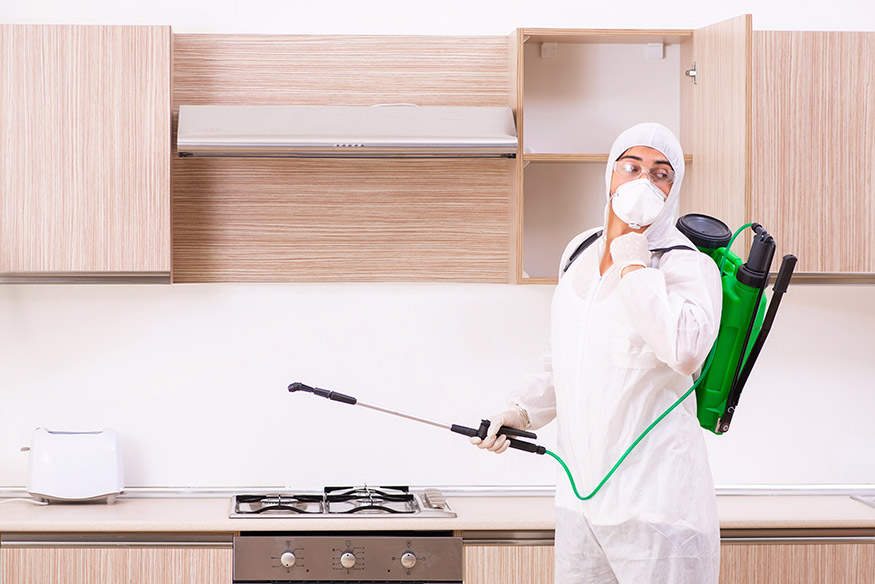
To be sure that you are eliminating every mosquito, you may also consider using an insecticide. Keep in mind that mosquitoes like to hide in dark humid places, so check your house thoroughly and treat each area well. Here are a few places to look
- Under the sink
- In closets
- Under furniture
- In the laundry room
Be sure to treat these areas well, as they are the most likely hideouts. You will want to be sure to exercise proper safety measures if applying a chemical inside your home. Follow these steps when applying the chemical.
#1: Clear the Area.
Anyone who isn't helping with the process shouldn't be near while mixing and applying the pesticides. This includes children and pets.
#2: Wear proper attire.
Make sure you are wearing clothes that will keep the chemicals from coming into contact with your skin. Long pants, a long sleeve shirt, and closed-toe shoes would be good.
#3: Mix the chemicals safely.
When mixing the chemicals, make sure you do it in a well-ventilated area so that you are not breathing in too many of the fumes that could be harmful to your health. If possible, mix them outdoors.
#4: Prepare the right amount.
Try to prepare only what you need for this use. You don't want to have to worry about storing or disposing and extra.
#5: Prepare for an accident.
If the chemical spills, you want to be prepared for cleanup. Have cleanup items like paper towels, sawdust, or kitty litter on hand to absorb the chemical. It would also be wise to have gloves and trash bags on hand.
You should also be prepared for a medical accident. Read the directions carefully to avoid this, but should it happen, be sure to have the number for the Poison Control Center on hand. The number is 1-800-222-1222.
#6: Remove items from the area.
It is important to remove any personal items from the area that you will be applying the chemical to. These could include clothes, toys, tools, or dishes. You want to make sure the chemicals do not touch them.
#7: Ventilate the area.
When spraying inside, you should properly ventilate the area so that you aren't breathing in the fumes. You could open windows and doors to let air in from outside.
#8: Wash up.
After you have applied the chemicals, be sure to wash your hands thoroughly before touching anything or anyone else.
When you spray your home, you should consider that the insecticide will likely kill any bugs inside your house, including any good bugs. Some bugs are considered helpful. Certain spiders eat other bugs and keep the population down in your home. If you don't mind them being inside, and if they are non-venomous, you may want to consider not spraying the areas where they live.
6. Use a natural insecticide
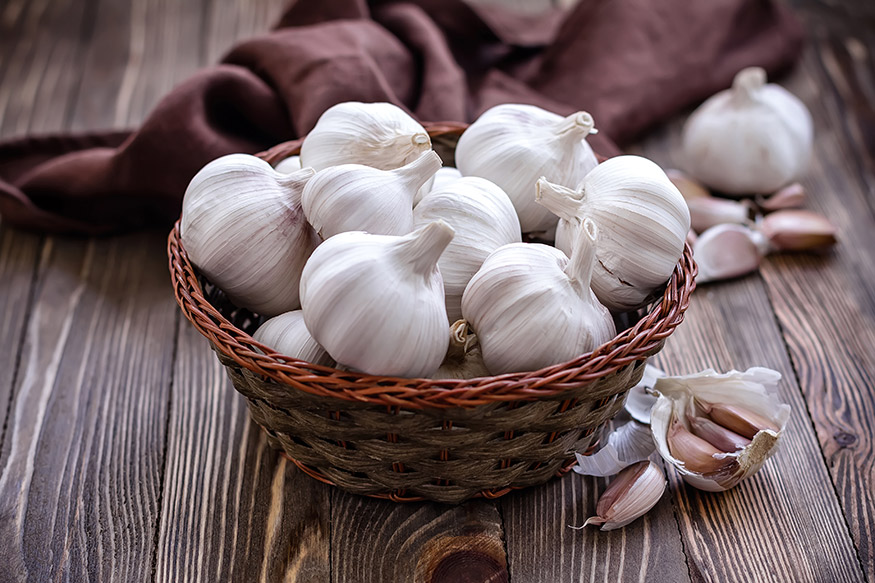
When you hear the word insecticide, does your mind automatically go to a chemical? Did you know that other options exist? There are some natural insecticides that you may want to consider if you wish to avoid contact with chemicals.
Garlic
Garlic can be used as a natural insecticide to keep the mosquito population down in your home. You may consider planting some garlic outside your windows and doors so that the scent keeps them from coming near those areas.
You could also make a spray and use it in much the same way you would use a chemical insecticide in your home. Be sure to spray any dark and damp areas well.
Camphor
Camphor is a waxy substance that comes from the wood of the camphor laurel tree. It is a natural mosquito repellent. The odor drives mosquitoes away. Camphor has been successfully used as an indoor mosquito repellent.
You can purchase camphor tablets that can be crushed in water and placed in dark corners to deter mosquitoes. Because these tablets dissolve quickly, you should be sure to replace them every few days. But, don't toss the old water. You can use it when you clean the floors as an extra safeguard against mosquitoes.
You can make a spray with camphor oil that can be sprayed in the damp and dark areas. This is also effective.
Plants
Another option is to use plants in your house and outdoors that will keep the mosquitoes from wanting to come near. A few of the most common plants that repel mosquitoes are:
- Basil
- Citronella
- Lavender
- Lemon Balm
- Peppermint
If you use them inside, try to place them in the areas that will most attract mosquitoes. If placing them outside, consider placing them in window boxes and/or near doors.
Tea Tree Oil
Tea tree oil is another effective indoor mosquito repellent. You can make a spray with tea tree oil and water to use in the areas most attractive to mosquitoes. You can also spray it around doors and windows.
Eliminate Mosquitoes Inside your house
To summarize:
- Buy an indoor mosquito killer or repellent spray. Use the recommended label instructions to get rid of mosquitoes indoors. You can also get an ultrasonic insect repeller or a bug zapper. Natural insecticides like garlic and camphor work too.
- When spraying mosquito killer sprays, treat humid and dark areas like under the sink and closets. Although highly effective, reapplying the mosquito spray may be necessary.
Related Posts
How To Get Rid Of Mosquitos In Your Yard
Mosquitoes go through four life cycle stages on their way to developing into blood-sucking adult insects. Understanding these life stages can go a long way to helping you eradicate these bugs in your yard.
Depending on mosquito species, eggs are either laid in water or in damp soil that frequently experiences flooding or pooling. In either case, the eggs require stagnant water to hatch and develop into mosquito larva. The larva will spend 4 to 14 days feeding and growing in the water before they pupate and turn into adult mosquitos.
Targeting the egg and larval stage of the mosquito is the best way to break up this pest's life cycle and eliminate adult mosquitos from your yard.
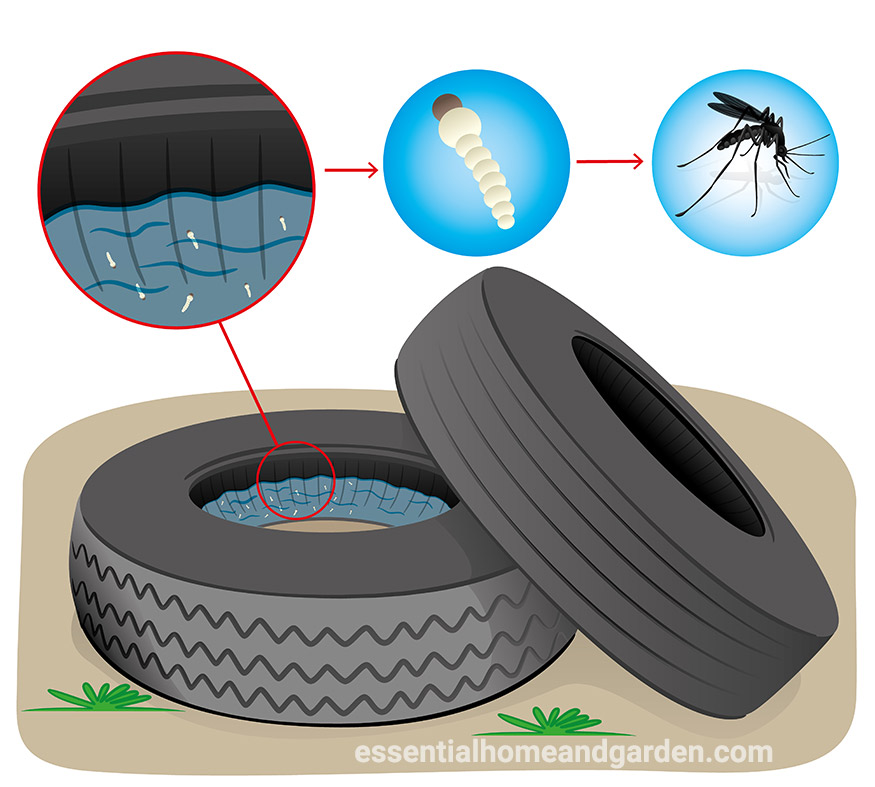
Once you have eliminated the mosquitoes from your house, it is wise to focus on the outdoor elimination to avoid a recurrence of them inside.
1. Eliminate standing water
Standing water in your yard can easily become a breeding area for mosquitoes. They prefer to lay their eggs in stagnant water. Try to eliminate these areas in your yard. But, if you can't eliminate them, consider dissolving some of the above-mentioned camphor tablets in them or strategically place plants around the areas that repel the mosquitoes to make it less inviting.
2. Remove Habitat if Possible
Because mosquitoes seek outstanding water to lay their eggs, it is crucial to keep your yard free from items that collect water and work to improve drainage anywhere water tends to pool on the ground.
Buckets, wheelbarrows, kid's pools, troughs, and even dog dishes can provide enough standing water for mosquitoes to lay eggs.
Be sure to store any buckets or other water-catching items upside down to prevent water from collecting inside of them. For larger items and those that can't simply be turned over, like wheelbarrows and tires, try to store them inside or cover them with a tarp to prevent pooling. Be sure to check the tarps–and similar covers over your pool and barbeque–to assure water isn't pooling on these as well.
For stock tanks, troughs, and decorative ponds that hold water, consider adding a water pump to circulate and oxygenate the water. This will create an environment unsuitable for mosquitoes to lay their eggs. Goldfish, which love to feed on mosquito larva, can also be added to stock tanks and ponds to reduce mosquito numbers.
Water pooled on the ground is another problem for breeding mosquitoes. If you notice stagnant puddles that stick around for more than three days after a rainstorm, you'll need to improve the drainage in that area to keep the water flowing out of your yard.
Consider digging trenches, adding downspout extensions, or creating french drains to help move water away from level areas. Planting water-loving bushes and trees in these areas can also help sop up any extra water that accumulates.
3. Treat Water For Mosquito Larvae
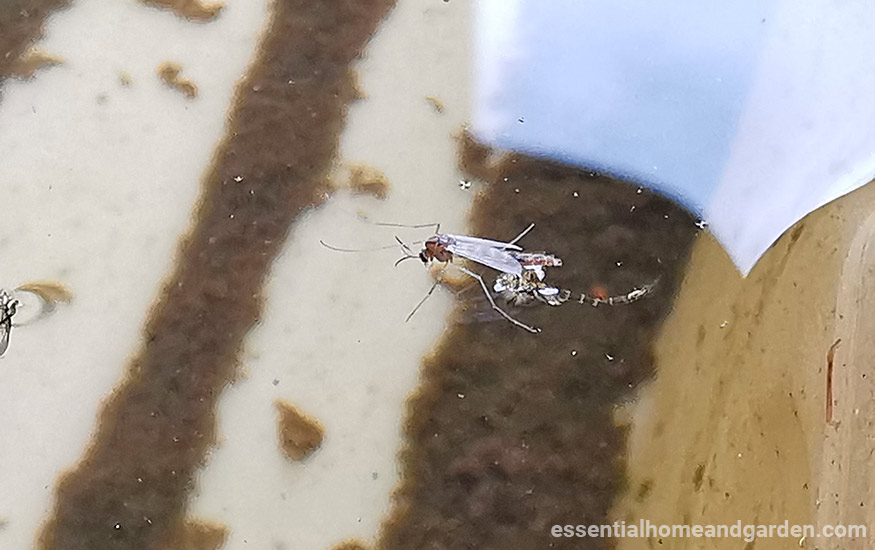
While removing mosquito habitat is the most effective way to eradicate these annoying pests, sometimes it just isn't possible to get rid of all standing water. If you live in an area that gets a lot of rain or have water features that seem to spawn mosquitos despite other measures, treating your water for mosquito larvae might be your best option.
The most popular choice for killing larvae in the water is with a mosquito dunk. These chemical tablets are dropped into the water to eliminate mosquitoes in the larval form. You can use most of these products in a fish pond but never for water for human consumption.
If you prefer a more natural approach, you can also use vegetable oil, soap, apple cider vinegar, and more to eradicate mosquito eggs and larvae. Learn more about these techniques in our article on how to kill mosquito larvae in water.
4. Use a Chemical Repellent
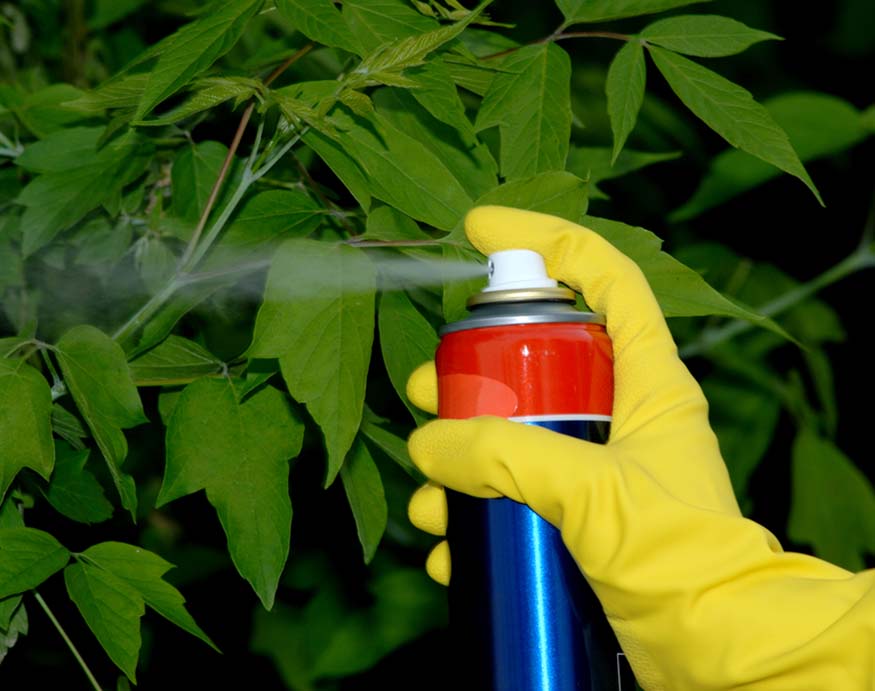
Eradicating larvae is a great way to reduce your future numbers of adult mosquitoes but won't do anything to lessen the number of mosquitoes already in your yard. If these buzzing bugs have taken over your property, spraying your yard with a special mosquito repellent can help.
During the day, mosquitos rest on foliage and in dark, damp recesses. By spraying these areas with chemical pesticides during these times, you can kill the mosquitos and repel others from taking up residence.
Most of these products utilize toxic chemicals that are harmful to people and pets, and bugs, so it is essential to take precautions when using these products. Others rely on natural compounds that target only insect physiology and are safe for use around waterways, pets, and family.
Some of the most popular chemical repellents are:
- Cutter Backyard Bug Control (chemical)
- Ortho Backyard Mosquito and Bug Control (chemical)
- Wondercide Outdoor Pest Control (natural)
- Cedarcide Yardsafe Mosquito Yard Spray (natural)
Yard sprays are an effective way to mitigate mosquito numbers all summer long. But keep in mind, even natural products will kill a wide range of bugs, many of which are beneficial to have in your lawn and garden.
5. Outdoor Mosquito Traps and Zappers
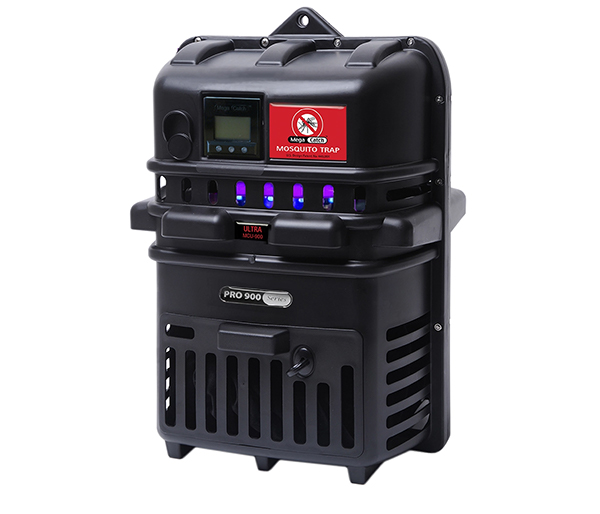
Another way to deal with active adult mosquitoes in your yard is to use a trap or zapper. Both of these products use an attractant to entice and then trap or kill mosquitos.
Traps that use carbon dioxide as an attractant are the most effective against mosquitoes since this is what the bugs use to find humans and animals to feed on. If you are looking for a serious trap that devastated the local mosquito population, then take a look at Mega Catch.
UV light is another popular method of attracting bugs but is less effective for mosquitos. Another option is a water trap, which attracts and traps biting females looking for somewhere to lay their eggs.
6. Burn Citronella Candles
Citronella is one of many natural scents that mosquitoes steer clear of. Because of this, burning citronella candles is an effective way to keep these pests away from you while you are enjoying your backyard or back patio.
When looking for citronella candles, try to find products made with a high percentage of citronella. Low-quality candles will not contain enough citronella to repel mosquitoes effectively. Candles with large wicks are doubly effective against these pests since they create more smoke–another smell mosquitoes try to stay away from.
7. Use Thermacell Units
Thermacell units use heat to disperse mosquito repellant into the air. Like citronella candles, these work well for protecting a specific space while you are enjoying your yard. They tend to be more effective than candles because the repellant vapor creates a protective barrier as it moves away from the heat source and begins to cool.
Most Thermacell units use unscented allethrin, a synthetic version of a chemical found in chrysanthemum flowers. This effective insecticide repels mosquitoes and is generally safe around humans, though caution should be taken if you have cats.
Best Choice

THERMACELL RADIUS ZONE GEN 2.0
- Repells mosquitos in a 15-foot zone
- Portable – 6.5 hours of battery time
- EPA reviewed for safetyu and effectiveness
8. Grow Plants That Mosquitoes Hate
Just as certain plants can repel mosquitoes inside your home, planting some species of plants around your yard can also help keep these bugs at bay.
Alliums, like garlic and onion, basil, mint, and citronella plants, can all help make your yard less desirable to these flying bloodsuckers. Plant these flowers around your patio and other areas of the yard where you spend a lot of time. Check out this article to see a full list of plants that repel mosquitoes.
9. Change Your Outdoor Lights To Yellow

It should come as no surprise that bugs are attracted to light. That is, after all, why bug zappers work so well. But did you know that bugs are only attracted to specific wavelengths of light?
Mosquitoes can only see short wavelengths like purples and blues. That is why they are attracted to ultraviolet lights. On the other hand, they cannot see and are not attracted to yellow lights.
By switching your outdoor lighting to yellow bulbs, you won't attract bugs. There are even specific types of bulbs called "yellow bug lights" that emit less heat, which gives you even more excellent protection against attracting bugs.
10. Invite Natural Predators To Your Yard
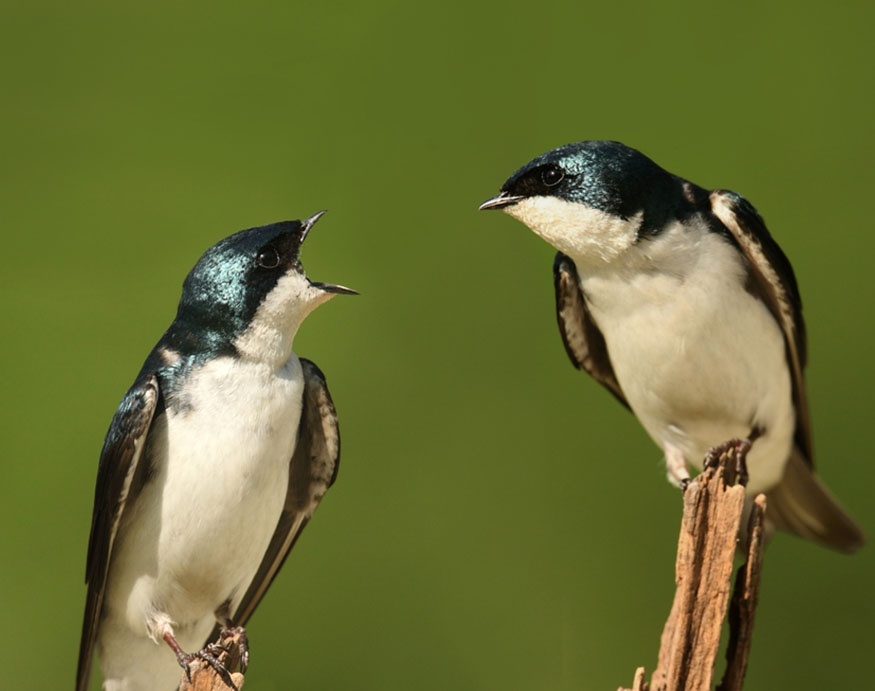
One of the simplest ways to get rid of mosquitoes is to attract wildlife that will do all the hard work for you. Bats, insect-eating birds, and dragonflies all love to feed on mosquitoes. By making your yard more welcoming to these animals, you automatically make it a less friendly place for mosquitoes.
You can attract bats by hanging wooden bat houses on your house and around your property. Because most mosquito-eating birds also feed on birdseed, you can guarantee these helpful predators hang around by putting out bird feeders or planting seed-heavy flowers like sunflowers and daisies. To attract dragonflies, you'll need a pond with a lot of vegetation in and around it. (Don't worry, dragonfly larvae eat mosquito larvae, so your pond will be more helpful than harmful in your fight against these pests.)
For more information check out our full guide on Mosquito Predators.
11. Oscillating Fans
Small flying bugs like mosquitoes do not like moving air. For this reason, putting an oscillating fan or ceiling fan in or around your outdoor sitting areas can do a lot to deter mosquitoes from bugging you. Fans won't do anything to decrease the total population of insects in your yard, but they will keep you safe from their bite in these protected areas.
12. Get a Professional To Help
If you've tried all the tips above and are still dealing with a large number of mosquitoes in your yard, then it may be time to contact a professional. Yard care services and pest companies often offer mosquito defense services. These typically include things like fogging, yard sprays, water treatment, and drainage help.
Hiring a professional isn't cheap, but their services are highly effective, especially when less intense methods have failed.
Use the form below to get a free quote from a pest control expert.
Related Posts
Mosquitoes Be Gone!
Mosquitoes pose a health risk to you and your loved ones. Doing your best to eliminate their presence is essential.
With these tips, you can begin taking steps to eliminate and repel mosquitoes in your house and around your yard. If you liked this article, be sure to comment below to share your thoughts!
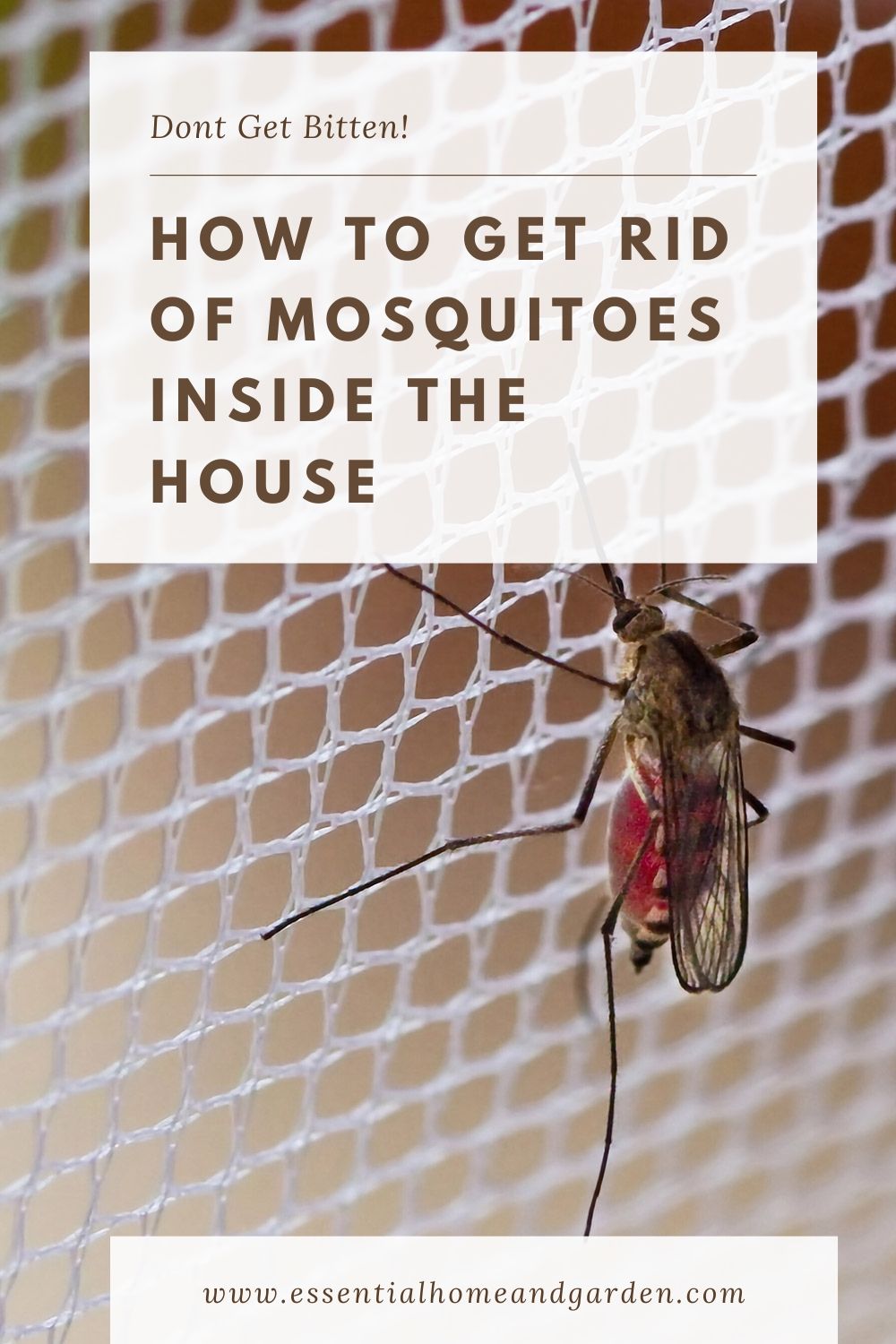
How to Get Rid of Mosquitoes in the House
Source: https://www.essentialhomeandgarden.com/how-to-get-rid-of-mosquitoes/